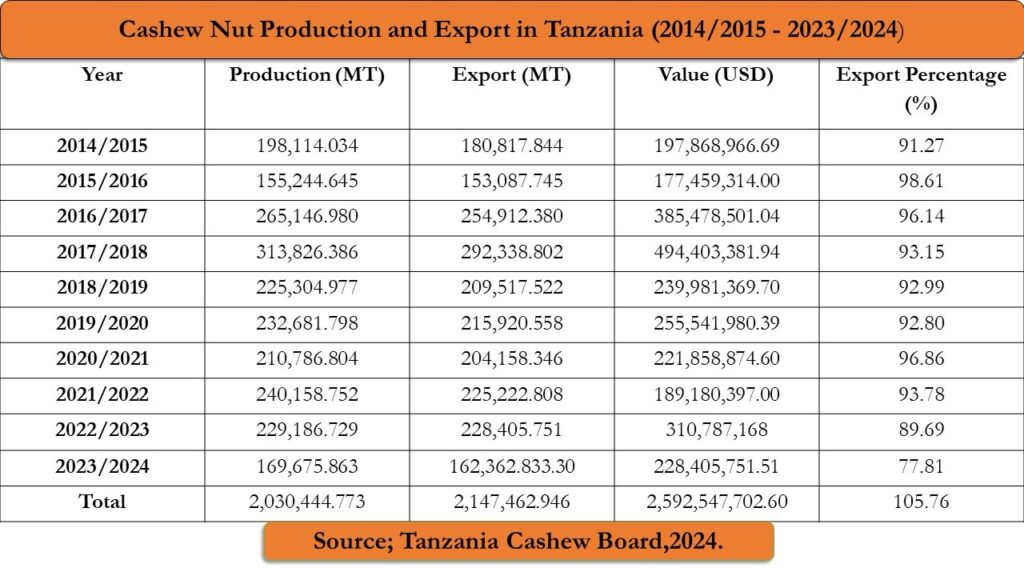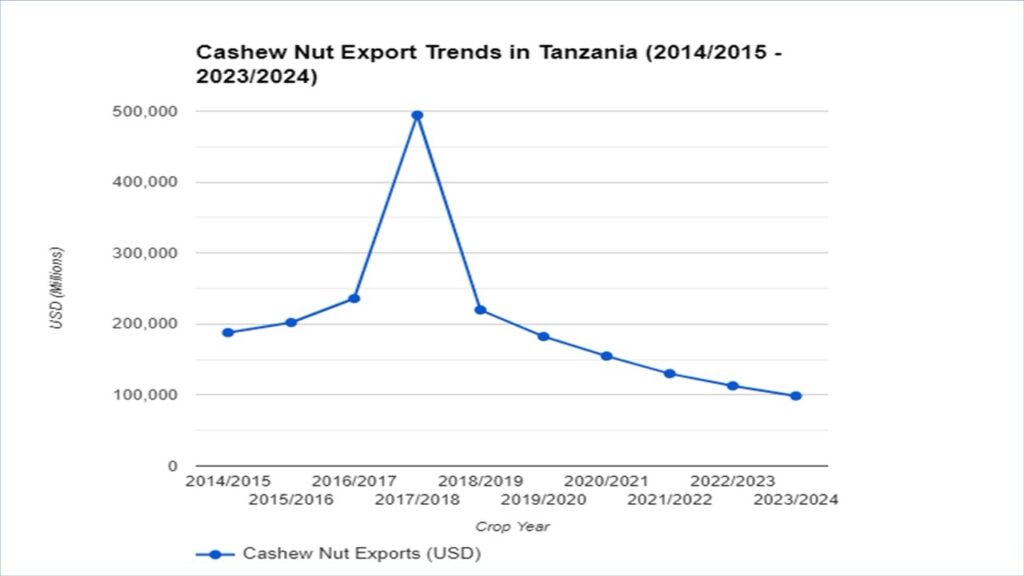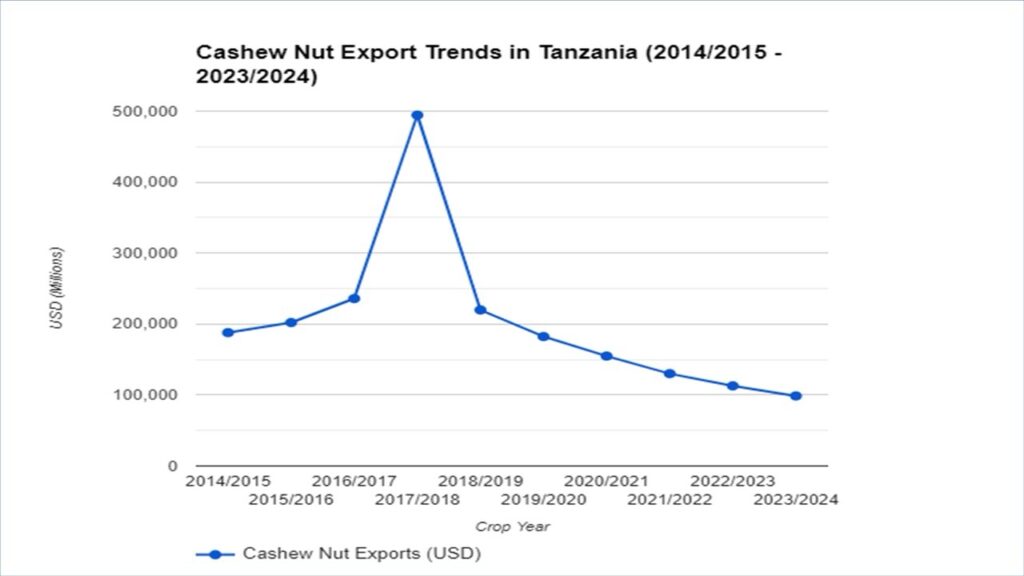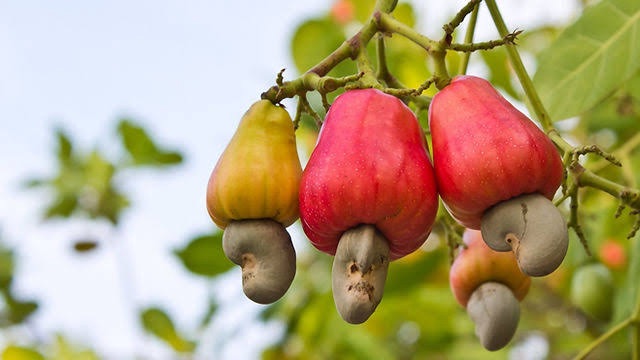Aziz Rashid.
Tanzania, known for its breathtaking landscapes and diverse agriculture, has quietly become a major player in the global cashew game.
The crop is proving to be a powerful driver of the nation’s economy, offering a promising path forward for both farmers and the country itself.
𝗔 𝗗𝗲𝗰𝗮𝗱𝗲 𝗼𝗳 𝗦𝘁𝗲𝗮𝗱𝘆 𝗛𝗮𝗿𝘃𝗲𝘀𝘁
Over the past ten years, Tanzania has shown remarkable consistency in cashew production.
Data from the Cashew Nut Board paints a picture of steady growth, culminating in a peak of 313,826 metric tons (MT) in 2017/2018. While some fluctuations are natural, recent years have seen production stabilize between 200,000 and 250,000 MT.
The ongoing season (2023/2024) is projected to yield around 169,676 MT (Tanzania Cashew Board, 2024).
This stable production translates directly to exports. Tanzania boasts a remarkable export rate, often exceeding 90%.
Last season, for instance, the country exported 228,406 MT out of 229,187 MT produced, accounting for 99.66% of its total production. This robust export performance highlights Tanzania’s deep integration into the global cashew supply chain.

𝗖𝗮𝘀𝗵𝗲𝘄 𝗣𝗼𝘄𝗲𝗿: 𝗙𝘂𝗲𝗹𝗶𝗻𝗴 𝘁𝗵𝗲 𝗘𝗰𝗼𝗻𝗼𝗺𝘆 𝗮𝗻𝗱 𝗘𝗺𝗽𝗼𝘄𝗲𝗿𝗶𝗻𝗴 𝗣𝗲𝗼𝗽𝗹𝗲
The cashew industry is a significant economic engine for Tanzania. It provides a livelihood for over 300,000 households, primarily in rural areas. This translates to a powerful tool for poverty alleviation, offering families a source of income and stability. The industry also generates substantial foreign exchange – the 2022/2023 season alone brought in a cool $310.78 million.

But the benefits extend beyond immediate income. The cashew sector stimulates local economies by fostering auxiliary industries like processing, packaging, and transportation. These activities create additional jobs, enhance income levels, and encourage the development of valuable skills and entrepreneurial spirit among the local population.

𝗟𝗲𝘀𝘀𝗼𝗻𝘀 𝗟𝗲𝗮𝗿𝗻𝗲𝗱: 𝗧𝗵𝗲 𝗥𝗼𝗮𝗱 𝗔𝗵𝗲𝗮𝗱
Despite its successes, the Tanzanian cashew industry faces challenges. Inconsistent production underscores the need for improvements in agricultural practices and infrastructure. Pests, diseases, and the ever-present threat of climate change pose significant risks to stable yields.
Addressing these issues requires strategic investments in research, extension services, and the adoption of sustainable farming techniques.
Another crucial lesson is the importance of value addition. Currently, Tanzania exports a significant portion of its cashews in raw form. Processing these nuts locally can significantly increase revenue and create more jobs.
Government policies that incentivize local processing could transform the industry and ensure a fairer share of the profits reaches Tanzanian farmers.
𝗔 𝗚𝗹𝗼𝗯𝗮𝗹 𝗖𝗼𝗺𝗽𝗮𝗿𝗶𝘀𝗼𝗻: 𝗟𝗲𝗮𝗿𝗻𝗶𝗻𝗴 𝗳𝗿𝗼𝗺 𝘁𝗵𝗲 𝗟𝗲𝗮𝗱𝗲𝗿𝘀
While Tanzania’s current production and export volumes are commendable, there is ample room for significant growth. Compared to cashew giants like Côte d’Ivoire, India, and Vietnam, Tanzania has ground to cover. These countries not only excel in cashew production but also lead in processing and exporting value-added cashew products.
For instance, Côte d’Ivoire, the world’s top cashew nut producer, contributed approximately 970,000 metric tons in 2022, valued at approximately $1 billion, according to database statistics from the UN Food and Agriculture Organization (FAOSTAT, 2022).
Vietnam, renowned for its extensive cashew processing capabilities, reported cashew kernel exports reaching 425,568.11 metric tons and generating a turnover of $2.432 billion USD in 2022, as documented by FAOSTAT and the Vietnamese General Department of Customs (2022).
India presents another instructive case. The country has successfully integrated smallholder farmers into advanced agricultural practices, resulting in high yields and superior-quality produce. Additionally, India’s focus on sustainability and innovation in cashew cultivation sets a benchmark for Tanzania to aspire to.
𝗧𝗵𝗲 𝗣𝗮𝘁𝗵 𝘁𝗼 𝗖𝗮𝘀𝗵𝗲𝘄 𝗦𝘂𝗽𝗿𝗲𝗺𝗮𝗰𝘆
To solidify its position in the global market, Tanzania needs to focus on several key areas:
✔️Research and Development: Investing in research to develop pest-resistant and high-yield cashew varieties will be crucial for stabilizing and increasing production.
✔️Infrastructure Upgrade: Improved transportation and storage facilities will minimize post-harvest losses and ensure more cashews reach the market in good condition.
✔️Value Addition is Key: Establishing more processing plants within the country can transform the industry. Exporting processed cashew kernels will significantly boost Tanzania’s export earnings and create more local jobs.
✔️Market Diversification: Exploring new international markets and establishing better trade agreements can reduce reliance on a few buyers and improve Tanzania’s bargaining power.
𝗔 𝗡𝘂𝘁𝘁𝘆 𝗙𝘂𝘁𝘂𝗿𝗲 𝗔𝘄𝗮𝗶𝘁𝘀
Tanzania’s cashew industry stands tall as a pillar of the country’s agricultural sector, offering substantial economic and social benefits. While challenges exist, the potential for growth is undeniable.
By learning from global leaders, making strategic investments, and fostering collaboration between the government, private sector, and farmers, Tanzania can not only solidify its position in the global cashew market but also become a true powerhouse in this lucrative sector. The future of Tanzania’s cashews is bright.




